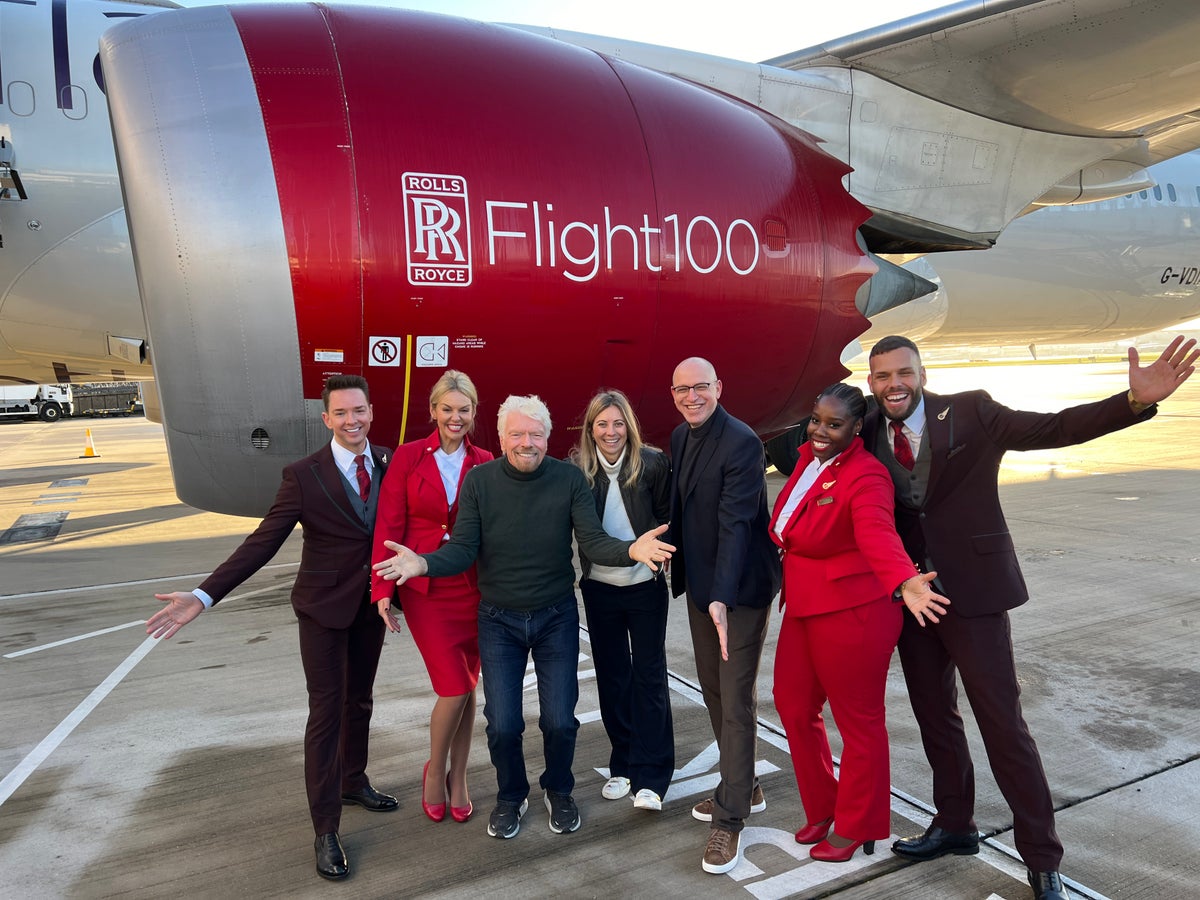
The first transatlantic flight powered only by “Sustainable Aviation Fuel” (SAF) is due to take off at 11.30am today from London Heathrow, destination New York JFK.
Virgin Atlantic is operating the Boeing 787 Dreamliner, branded as “Virgin100”, on the world’s busiest international air route. The airline has obtained special approval from British, Irish, Canadian and US aviation authorities to fly the pioneering mission.
The founder of Virgin Atlantic, Sir Richard Branson, and the transport secretary, Mark Harper, will be aboard the aircraft – though it will not carry any paying passengers.
SAF is made from sustainable sources such as agricultural waste and used cooking oil, meaning its production involves using about 70 per cent less carbon.
The two Rolls-Royce engines will be mainly fuelled by processed waste fats, known as HEFA (hydroprocessed esters and fatty acids). But 12 per cent of plant-based “synthetic aromatic kerosene” (SAK) is added to provide the necessary mix for the engines to function normally.
Virgin Atlantic claims the fuel offers “CO2 lifecycle emissions savings of up to 70 per cent, whilst performing like the traditional jet fuel it replaces”. The emissions from the 3,451-mile flight will be exactly the same as with a kerosene-powered flight.
Savings are claimed from elsewhere in the lifecycle – for example CO2 absorbed from the atmosphere during the growth of plants, and from avoiding household waste going to landfill.
Environmental campaigners dispute the benefits, and say only a cutback in flying can significantly reduce the harm caused by aviation.
But speaking exclusively to The Independent, Virgin Atlantic’s chief executive, Shai Weiss, said: “To think that we can magic up elimination of flying, I think is naive to an extreme.”
His airline says the aim is to demonstrate that SAF is a “safe drop-in replacement for fossil derived jet fuel, compatible with today’s engines, airframes and fuel infrastructure”.
Sir Richard said: “The world will always assume something can’t be done, until you do it. The spirit of innovation is getting out there and trying to prove that we can do things better for everyone’s benefit.
“Virgin Atlantic has been challenging the status quo and pushing the aviation industry to never settle and do better since 1984. Fast forward nearly 40 years, that pioneering spirit continues to be Virgin Atlantic’s beating heart as it pushes the boundaries from carbon fibre aircraft and fleet upgrades to sustainable fuels.
“I couldn’t be prouder to be onboard Flight100 today alongside the teams at Virgin Atlantic and our partners, which have been working together to set the flight path for the decarbonisation of long-haul aviation.”
Mr Harper said: “Today’s 100 per cent SAF-powered flight shows how we can decarbonise transport both now and in the future, cutting lifecycle emissions by 70 per cent and inspiring the next generation of solutions.
“This government has backed today’s flight to take-off and we will continue to support the UK’s emerging SAF industry as it create jobs, grows the economy and gets us to Jet Zero.”
But environmental campaigners say the potential benefits of SAF are overstated – and that there are multiple problems with the supply of the fuel.
Anna Hughes, director of Flight Free UK, said: “While it sounds promising that a flight can be fuelled with 100 per cent SAF, we are many years away from seeing so-called ‘sustainable’ fuels in widespread use.
“We simply don’t have enough resources to create enough SAF to satisfy our current, or indeed future, demand for flights. We don’t have time to wait, so the reality is that in order to reliably bring down flight emissions, we need to be flying less, which is certainly not what the industry wants to hear.
“This is a seminal moment for the industry and government, allowing them to pretend that we can continue to fly as much as we like with no harm to the environment. The reality is that we still haven’t worked out how to meaningfully reduce the environmental harms of flying, so the short-term answer must be that we need to do it a lot less.”
The first fully SAF-powered flight of a UK aircraft took place a year ago, when an RAF Voyager aircraft – the military version of an Airbus A330 – made a test flight from Brize Norton in Oxfordshire.







